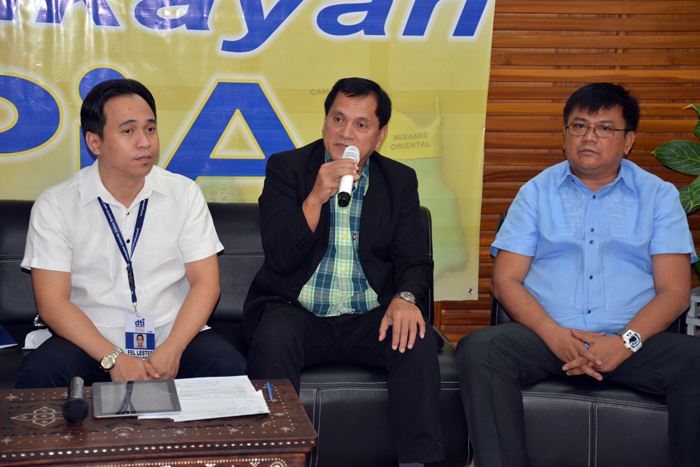“There is a need to institutionalize good regulatory practice as we move to the ASEAN Economic Community.”
Deputy Director-General Emmanuel Esguerra of the National Economic and Development Authority (NEDA) maintained that ensuring the quality of regulations through the building of a coherent regulatory system is crucial for the Philippines not only to keep up with its regional neighbors but also to build a sustainable and inclusive society—one where growth is felt at all levels.
In his keynote remarks at the Policy Dialogue on Effective Regulations for Sustainable Growth organized by state think tank Philippine Institute for Development Studies (PIDS) last September in Makati City to celebrate the 13th Development Policy Research Month (DPRM), Esguerra emphasized the need to review the country’s regulatory system to address barriers to trade and boost investments.
“Given that regulation is one of the three anchors along with tax and spending that governments draw on to achieve sustainable and inclusive growth, it is imperative for the Philippines to review its regulatory system, assess the environment for institutionalizing good regulatory practice, and formulate a regulatory framework to be able to pull alongside other ASEAN economies especially now that we are moving toward ASEAN integration,” Esguerra stated.
He explained that this will help government in addressing behind-the-border issues that discourage foreign and domestic businesses to invest in the country.
Challenges to establishing an RMS
Meanwhile, PIDS President Gilberto Llanto highlighted the need for a strong and coherent regulation management system (RMS). According to Llanto, the country has the regulatory quality tools, the regulatory processes, the regulatory institutions, and the regulatory policies, which are the major elements of an RMS.
“What the country lacks is a central oversight body that will that will conduct regulatory impact assessment to determine the probable costs and benefits of proposed regulations. The absence of a formal RMS results in the lack of coherency of our regulations brought about by weak coordination across government agencies and regulatory bodies when it comes to creating regulatory policies. Implementing regulation also runs into trouble with usually weak institutions unable to carry out their regulatory mandate,” Llanto noted.
Representatives from various regulatory bodies also shared their experiences as well as the innovations they introduced to come up with effective regulations. Speakers included Atty. Winston M. Ginez, chairperson of the Land Transportation Franchising and Regulatory Board, Mr. Efren Borci, administrator of the Maritime Industry Authority (MARINA), and Mr. Garry Domingo, head of the Quezon City Business Process and Licensing Office.
According to Atty. Ginez, LTFRB focuses on four regulatory issues– competition, innovation, productivity, and growth. To create better competition, the LTFRB has launched several regulatory reforms, which include requiring buses to strictly comply with its 15-year age limit for public utility vehicles and to install global positioning system (GPS) devices. The GPS device enables the LTFRB to determine whether the unit is following its authorized route and maintaining the prescribed speed limit.
A more popular regulatory innovation enforced by the LTFRB in the past year was the adoption of a regulatory framework for transportation network companies and transportation network vehicle services like Uber. According to Ginez, the Philippines is the first country to successfully develop a regulatory model for the sharing economy, which is expected to introduce more competition in the public utility vehicle sector.
In terms of regulatory principles, Ginez underscored the implementation of an open and transparent process, and agreed with Llanto on the need to conduct a regulatory impact assessment prior to the passing of a regulation. “Our goal is to simplify regulations, and to keep the public informed and engaged in the process through consultations and dialogues,” he said.
Domingo of the Quezon City Business Permit and Licensing Office shared how they reduced the length of time to register businesses. The local government has streamlined regulations by putting up a business one-stop shop that integrates the registration processes of five government line agencies (Department of Trade and Industry, Bureau of Internal Revenue, Home Development Mutual Fund, Philippine Health Insurance Corporation, and Social Security System) into a single application system, cutting down the processing time from two weeks to 30 minutes. Future innovations include setting up of facilities for online and mobile money payments.
Meanwhile, Borci of MARINA gave an overview of the innovations in the four areas of the maritime industry, namely, overseas shipping, domestic shipping, development of maritime manpower, and ship building and ship repair.
Simplifying applications for ship operations, improving the use of nautical highways, allowing multiple-port calls for foreign ships, and granting domestic ships operational flexibility and permits that allow them to operate for the next three to five years were some of the innovations that MARINA introduced to streamline the regulatory process.
But Borci noted that regulatory issues remain. He emphasized the need to improve registration systems so that international ships can register in the country.
MARINA also focuses on the development and protection of seafarers given the increasing number of Filipinos who are engaged in this profession. According to Borci, 90 percent of the volume of international trade is carried at sea and a quarter of the manpower comes from the Philippines.
It is clear that regulatory reform is a continuous process. But as the anecdotes from each sector demonstrated, a centralized regulatory system, with strict conduct of regulatory tools like regulatory impact assessment across all sectors, would help ensure the quality of regulations, simplify the processes, and reduce the regulatory failures that inhibit sustainability and inclusiveness.
The dialogue, held last September 17, was the culmination of the 13th DPRM, an annual celebration aimed at promoting and drawing public awareness on the important role of policy research in nation-building. ###
Improving quality of regulations to spur investment, more jobs
 TUGUEGARAO CITY--State think tank Philippine Institute for Development Studies (PIDS) stressed the need to improve the quality of policies and regulations in the Philippines to further boost economic growth and be able to compete with ASEAN neighbors in terms of attracting investments.
TUGUEGARAO CITY--State think tank Philippine Institute for Development Studies (PIDS) stressed the need to improve the quality of policies and regulations in the Philippines to further boost economic growth and be able to compete with ASEAN neighbors in terms of attracting investments.
In a press conference in Tuguegarao City organized by the PIDS in partnership with the Philippine Information Agency, PIDS Senior Research Fellow Marife Ballesteros, highlighted the need to look at the existing regulations issued by the national and local government and assess whether these regulations are still effective and relevant.
“We need to improve the design and enforcement of our regulations. PIDS therefore is recommending to have all laws reviewed to determine whether they are properly designed, still relevant, and enforced properly.”
Read more: Improve quality of regulations to spur investment, more jobs
DPRM regional forum in Laoag tackles local regulatory reform experiences and best practices
 LAOAG CITY - The Development Policy Research Month (DPRM) rolled into the city of Laoag on September 16. With the help of the Philippine Information Agency-Region 1 and the Northwestern University, state think tank Philippine Institute for Development Studies (PIDS) convened academe and local government officials, and university students in a forum that tackled this years theme DPRM, "Tamang Regulasyon para sa Patuloy na Pag-Ahon".
LAOAG CITY - The Development Policy Research Month (DPRM) rolled into the city of Laoag on September 16. With the help of the Philippine Information Agency-Region 1 and the Northwestern University, state think tank Philippine Institute for Development Studies (PIDS) convened academe and local government officials, and university students in a forum that tackled this years theme DPRM, "Tamang Regulasyon para sa Patuloy na Pag-Ahon".
Dr. Sheila Siar, director of the Research Information Department of PIDS, shared the purpose of the 13th DPRM celebration and the importance of the theme.
The diverse panel of discussants included Mr. Benjamin Garcia, provincial director of the Department of Trade and Industry (DTI), Ms. Susan Gagarin, assistant chief of the Provincial Land Transportation Office, and Mr. Ronald John P Gabriel, officer-in- charge of the Licensing Division Office at Batac City.
Stronger cooperation and coordination among regulatory bodies needed for greater competitiveness
CAGAYAN DE ORO CITY— Stronger cooperation and coordination among various regulatory bodies can be a great help in achieving competitiveness.
This was the consensus of local regulators, local government officials, and media who attended the press conference on the Development Policy Research Month (DPRM) in Cagayan De Oro City last September 9.
Speaking at the weekly Kapihan of the Philippine Information Agency (PIA) in Cagayan De Oro City, Dr. Danilo Israel, senior fellow at state think-tank Philippine Institute for Development Studies, emphasized the need for regulators to work together to address issues and promote ease of doing business. He also cited the need for a framework to review and study all these regulations so that flaws can be identified and proper solutions can be introduced.
Shaping Mindanao’s Sustainable and Inclusive Future Together
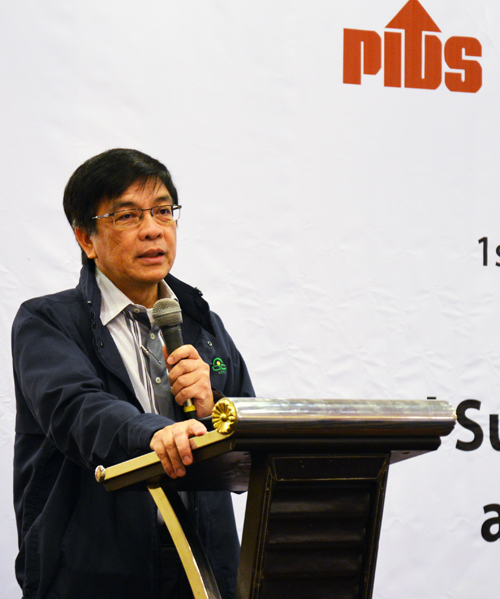 Mindanao is set to shake off its troubled past for a more sustainable and inclusive future, driven by effective policies and strong governance. The region fortified its commitment to development through the newly forged partnership between the Mindanao Development Authority (MinDA) and state think tank Philippine Institute for Development Studies (PIDS).
Mindanao is set to shake off its troubled past for a more sustainable and inclusive future, driven by effective policies and strong governance. The region fortified its commitment to development through the newly forged partnership between the Mindanao Development Authority (MinDA) and state think tank Philippine Institute for Development Studies (PIDS).
Capping off the first week of the 13th Development Policy Research Month, an inaugural development policy research forum—the first of its kind in Mindanao—was held last September 4 to mark the PIDS-MinDA institutional partnership. The full-day event focused on the policy research opportunities and challenges of the theme, “Advancing Mindanao: Toward Sustainable Economic Development and Balanced Ecosystems”. PIDS President Dr. Gilberto Llanto and MinDA Executive Director Undersecretary Janet Lopoz signed a memorandum of understanding on behalf of their institutes, then delivered their respective remarks on the significance and the potential of the partnership. They were joined anew in a mid-day press conference together with Mindanao leaders from various sectors.
Read more: Shaping Mindanao’s sustainable and inclusive future together
PIDS, MinDA hold inaugural policy forum to strengthen development ties
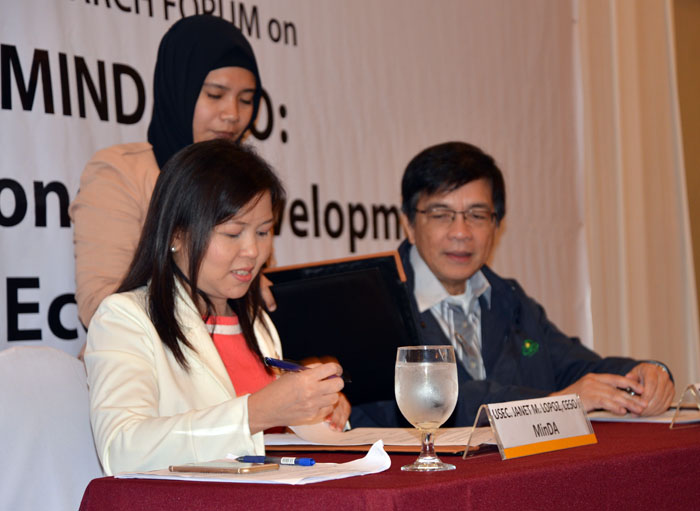 DAVAO CITY--State think tank Philippine Institute for Development Studies (PIDS) and Mindanao Development Authority (MinDA) reinforced partnership through the signing of a memorandum of understanding (MOU) during the 1st Mindanao Policy Research Forum on September 4, 2015, at the Waterfront Insular Hotel in Davao City. The forum, which centered on the theme “Advance Mindanao: Toward Sustainable Economic Development and Balanced Ecosystems”, brought together more than 100 participants from the government, academe, business, and civil society sectors, including the media, in Mindanao to underscore the potentials of policy research in pursuing development goals.
DAVAO CITY--State think tank Philippine Institute for Development Studies (PIDS) and Mindanao Development Authority (MinDA) reinforced partnership through the signing of a memorandum of understanding (MOU) during the 1st Mindanao Policy Research Forum on September 4, 2015, at the Waterfront Insular Hotel in Davao City. The forum, which centered on the theme “Advance Mindanao: Toward Sustainable Economic Development and Balanced Ecosystems”, brought together more than 100 participants from the government, academe, business, and civil society sectors, including the media, in Mindanao to underscore the potentials of policy research in pursuing development goals.
In her keynote message, Undersecretary Janet Lopoz, executive director of MinDA, said that the inaugural forum formalizes their partnership with PIDS. “[The partnership] is significant in bridging the gap in our policy research—or the gap that persists between the creation of information and their application to policymaking,” she added.
Based on the MOU, the partnership aims to promote policy research and knowledge sharing in support of Mindanao’s development needs, facilitate access to policy studies and materials produced by higher education institutions in Mindanao, and establish the Mindanao Knowledge Center (MKC) with the assistance of the Socioeconomic Research Portal for the Philippines (SERP-P) team of PIDS.
PIDS President Gilberto Llanto agreed that interagency cooperation, such as the PIDS and MinDA partnership, emphasizes the importance of producing evidence-based policy. Llanto, in his opening remarks, shared a particular message of the forum that “life becomes meaningful only if you live it for something out there.” He elaborated that contributing to the betterment of society—through relevant research, policies, and regulations—is one way to make life meaningful.
Read more: PIDS, MinDA hold inaugural policy forum to strengthen development ties
PHOTO RELEASE
PIDS, MinDA formalize new development partnership
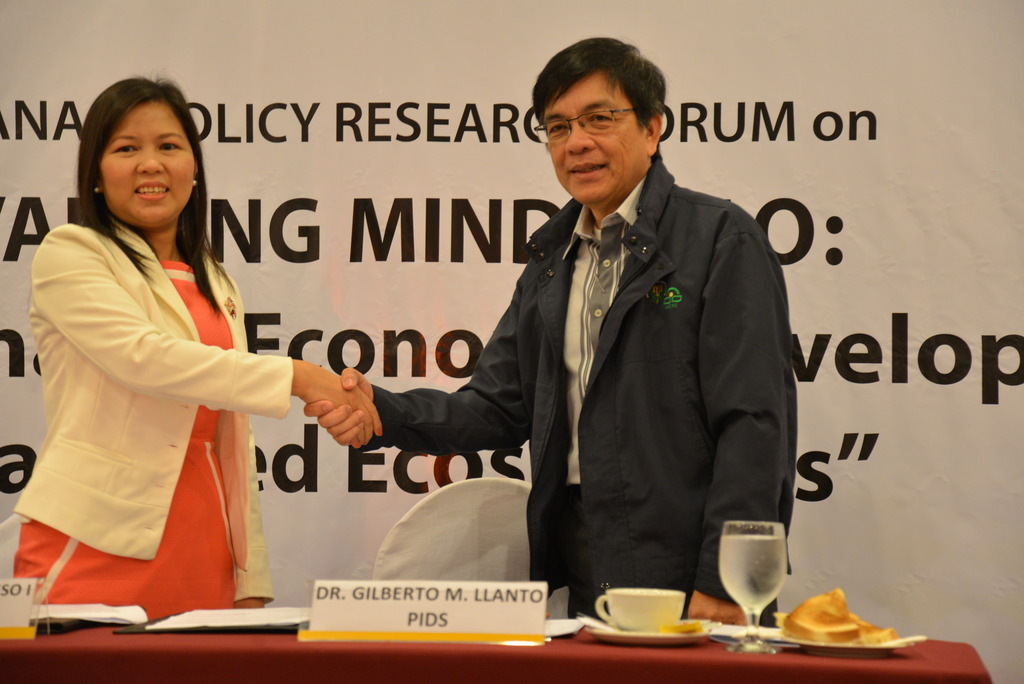
DAVAO CITY--State think tank Philippine Institute for Development Studies (PIDS) and Davao-based Mindanao Development Authority (MinDA) formalized their new development partnership on September 4, 2015, during the 1st Mindanao Policy Research Forum held at the Waterfront Insular Davao. On behalf of their respective institutions, PIDS President Dr. Gilberto Llanto and MinDA Executive Director Undersecretary Janet Lopoz agreed to join forces in promoting the conduct of policy research and knowledge-sharing activities in support of Mindanao’s development needs. The memorandum of understanding signed by Llanto and Lopoz also includes the establishment of the Mindanao Knowledge Center (MKC), a knowledge hub of socioeconomic studies conducted by higher education institutions in Mindanao. The MKC is envisioned to serve as a knowledge resource for local policymakers in crafting policies and programs that will enhance Mindanao’s competitiveness under the ASEAN Economic Community and help achieve inclusive and sustainable growth for Mindanaoans.
PIDS launches national celebration of 13th Development Policy Research Month
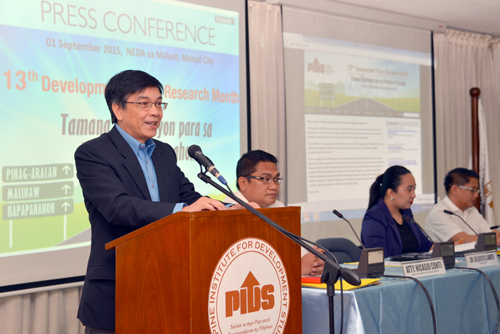 The Philippine Institute for Development Studies kicked off the month-long celebration of the Development Policy Research Month at a press conference on September 1, 2015. An annual national advocacy promoting evidence-based policy research, the DPRM focused its 13th year on the pressing theme of Effective Regulations for Sustainable Growth.
The Philippine Institute for Development Studies kicked off the month-long celebration of the Development Policy Research Month at a press conference on September 1, 2015. An annual national advocacy promoting evidence-based policy research, the DPRM focused its 13th year on the pressing theme of Effective Regulations for Sustainable Growth.
Dr. Gilberto Llanto, PIDS president, presented his study, Reducing Regulatory Burden, Improving Regulatory Quality. He was joined by representatives from regulatory bodies to share their experiences of trying to strike the balance between regulation and competition in their respective fields. The panel of speakers included Atty. Mary Ann Salada, public information officer of the Land Transportation Franchising and Regulatory Board (LTFRB); Atty. Nicasio Conti, deputy administrator for planning of the Maritime Industry Authority (MARINA); and Mr. Garry Domingo, head of the Quezon City Business Process and Licensing Office.
The speakers demonstrated the timeliness of the topic, presenting successes and difficulties in regulatory reform within their regulatory jurisdictions. Their presentations supported Llanto’s call for collaborative efforts to establish a more competitive and more coherent regulatory environment, and emphasized that a regulatory management system (RMS) is an essential strategic tool for sustainable and inclusive growth.
Read more: PIDS launches national celebration of 13th Development Policy Research Month
New partnership seeks to strengthen use of research evidence for policymaking in Mindanao
 State think thank Philippine Institute for Development Studies (PIDS) and Mindanao Development Authority (MinDA) are set to begin a new development partnership this September, a most opportune time as the Philippine bureaucracy celebrates the 13th Development Policy Research Month (DPRM).
State think thank Philippine Institute for Development Studies (PIDS) and Mindanao Development Authority (MinDA) are set to begin a new development partnership this September, a most opportune time as the Philippine bureaucracy celebrates the 13th Development Policy Research Month (DPRM).
On September 4, PIDS President Dr. Gilberto Llanto and MinDA Chairperson Undersecretary Lualhati Antonino will sign an agreement that will promote policy research and knowledge sharing in support of Mindanao’s development needs, facilitate access to policy studies and materials produced by higher education institutions (HEIs) in Mindanao, and establish the Mindanao Knowledge Research and Policy Center (MKRPC).
“This partnership has a lot of potential in creating synergies for the development of Mindanao. Given the Institute’s limited financial, human, and technical resources, we cannot cover the entire Philippines to effectively carry out our mandate. We need to multiply ourselves. We see MinDA as an excellent partner in promoting evidence-based policymaking at the local level and in increasing the relevance of our policy studies,” says Llanto.
Read more: New partnership seeks to strengthen use of research evidence for policymaking in Mindanao
Policy research month celebration calls for improving regulatory quality in PH
 This September, PIDS will again lead the nation in celebrating the Development Policy Research Month (DPRM). This nationwide event, which state think tank Philippine Institute for Development Studies (PIDS) started in 2003, is aimed at promoting and drawing public awareness on the importance of policy research in nation-building.
This September, PIDS will again lead the nation in celebrating the Development Policy Research Month (DPRM). This nationwide event, which state think tank Philippine Institute for Development Studies (PIDS) started in 2003, is aimed at promoting and drawing public awareness on the importance of policy research in nation-building.
This year’s theme, "Tamang Regulasyon para sa Patuloy na Pag-ahon (Effective regulations for Sustainable Growth)”, is a call for improving regulatory quality in the country to ensure that our policies and laws are facilitating competition, innovation, productivity, and growth.
There are regulations in the electricity, transport, and water sectors that are not responsive to both economic and social objectives, and business regulations that are detrimental to the investment climate. These issues stem from poor regulatory vetting processes that neglect the importance of research evidence and systematic assessment of proposed policies and regulations before they are implemented. Through the DPRM, we hope to influence our policymakers to take action in building a formal regulatory management system that adopts explicit standards for regulatory quality and ensures the integrity and quality of new regulations through the use of regulatory impact analysis, systematic public consultation procedures, and effective regulatory coordination among concerned agencies.
Read more: Policy research month celebration calls for improving regulatory quality in PH




